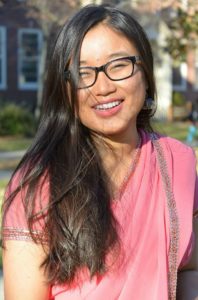1988 – 2018: 30 Years of Berea College Watson Fellows
an interview with
Sunaina Sherchan
Each year, graduating seniors from 40 institutions around the nation are eligible to apply for the Thomas J. Watson fellowship. Its purpose is to grant those seniors the means to complete an independent project outside of the United States.

Since its induction as a partner institution in 1988, Berea College has had 37 Watson recipients. This year’s winner, Sunaina Sherchan, Berea College Class of 2018, will be learning about folktale traditions and has plans to visit Japan, New Zealand, and Finland. We asked her to share experience with us.
What encouraged you to apply for the Watson?
I’m originally from Nepal, and scholarships are unheard of there. When I was applying to Berea College, I thought the opportunity was unreal, and I spent a lot of time checking to see if I had been accepted. This was practically a free education in the United States. My freshman year I became interested after I learned that there had been a recipient, Tuvshinzaya Amarzaya (’15), on campus. I was encouraged to start thinking about my project proposal from the beginning of my time here.
What was your passion or inspiration for your proposal?
I went back home for the first time in three years to go to the Bara Barsa festival that is held in the Himalayas once every twelve years. It was there that I was fully immersed in the culture of my ethnic Thakali community for the first time. I listened as people engaged in storytelling and shared traditional folktales and fairytales. These tales helped shape my identity, and I wondered how similar traditions around the world affected members of their communities.
What resources did you use as a source for inspiration as you wrote your personal statement?
The Watson website has a list of recipients and their project proposals and you can find many resources online from other colleges’ recipients. There is also a binder provided in the office at the Center for International Education that has several examples. These examples helped me understand many different ways that I could present my ideas, but it’s important to stay true to how you write. I used them as sources for inspiration. I think it is important to write a statement first and then use these resources as guides for editing.
What was the process like?
When the results revealed the four nominees on campus, we all went through a series of several mock interviews. As a group we spent time together discussing our passions and supporting each other as we wrote and revised our proposals. I spoke to others who were familiar with the process. I don’t think that I would have won without the support that I had through it all. One of the things I least expected was how excited some people were for me when I had received the fellowship.
What do you think it takes in order to be a successful Watson winner?
They want to help you succeed in exploring a topic that you’re passionate about and you want to be able to convey this in a genuine and creative manner. You should know why you’re so invested in this project and be able to clearly explain what it means to you. If you have multiple ideas, it’s important that you stick to the one that can most accurately reflects your dedication and engagement in your countries of interests and the theme of your project.
What advice do you have for other students?
There are a lot of people who start applying for the Watson, but many end up not completing their applications. My advice is to at least try. You are lucky enough to be from a limited group of applicants from forty* institutions. Even if you don’t win, you get valuable learning experience to use toward future opportunities.
Another tip I have is to not be too discouraged about discussing your ideas with others. At first I was worried about sharing my stories with others, but doing so helped me see how those who listened perceived them. Hearing their responses helped me see ways I could make improvements.
An important thing to keep in mind is that the project should mean something personal to you and be centered on a passion that you’re deeply invested in. You want to be able to express the details of your plans in a way that reflects the bigger picture and how connected and invested you are in your project.
Interested in applying? We’re now accepting applications for students graduating in December 2018 and May 2018.